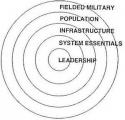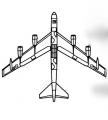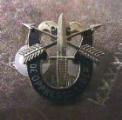Below is from a thesis I wrote on Unconventional Operations in 1994-95 when I was trying to describe the Post Cold War World. Obviously not a definition but a description:
Conflict is defined as "an armed struggle or clash between organized political parties within a nation or between nations in order to achieve limited political or military objectives." This definition, though somewhat more ambiguous than war, is still rather straightforward and simple to understand. However, non-conventional conflict is something even more ambiguous and difficult to understand. It extends the continuum of conflict. Conflict in the conventional sense begins when the armed struggle begins; however, non-conventional conflict encompasses all of the types of conflict listed above, starting with the threat or possibility of conflict and extending past conflict termination, because the conditions that gave rise to hostilities in the first place may still remain, though not visible or easily recognized. It also includes armed clashes by unorganized groups that are not seeking to achieve any political or military objectives.
Non-conventional conflict encompasses the lawlessness of a society in which the governmental system has collapsed, but no organized group has risen to take its place. Violence and terrorist-like activity can occur out of frustration with no identifiable purpose. This type of conflict is non-conventional, because it is difficult to determine the objectives and methods of the actors, perhaps difficult to even determine the actors, and thus it is difficult to apply conventional elements of power. This is the sensitive and complex environment in which operations may increasingly take place. Although the situation may not be a traditional insurgency, there will likely be many of its characteristics present. In these types of non-conventional environments it is the issue of perceived legitimacy by the people and the political powers involved that places new stresses on military forces whose legitimacy is no longer a matter of fact.
don't have to worry about what Wing Wang Zu or Karl Von Bergermeister said 500 years ago. Just study the facts....understand the system....and counter it.













Bookmarks